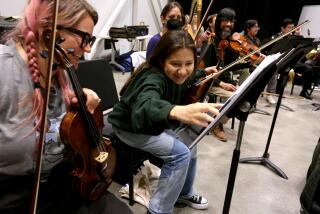The Barton Workshop Makes Creative Sounds in Zipper Hall
A select Dutch new music group plays in Zipper Hall of the Colburn School. No one is there to hear it. Does it make a sound?
The answer is yes. Marvelous sounds, in fact, the likes of which you wouldn’t believe.
It isn’t completely true that no one was there Monday night for this installment by the Barton Workshop in CalArts Musical Explorations 2000 festival. A dozen of us showed up, an audience precisely double the size of the ensemble. But it was still few enough listeners to make the hall feel depressingly desolate. And the concert was free, no less!
Blame the cruel hearts at CalArts. The school did outrageously little to get the word out, even neglecting to list the concert on its Web site festival calendar. Indeed, disrespectful presenters scheduled these illustrious musicians on a night when much of their potential audience was likely to be at the Los Angeles Philharmonic’s George Crumb tribute and then simply left the ensemble alone to its own thankless devices in deserted downtown. Still, it was a stimulating, exceptional evening.
The Barton Workshop, which was formed in Amsterdam 10 years ago by American composer and trombonist James Fulkerson, is something of an avant-garde version of the city’s celebrated early music groups. Like those early music experimentalists, the Barton Workshop players blend research and creativity, the research here being into cutting-edge ways of making sound. Also like the best of Amsterdam’s new music groups, the players are not only superb virtuosos, but honor a style of playing that is very clean, dry, pure.
The Workshop has a taste for the American experimental tradition--it has made superior recordings of Morton Feldman and John Cage for the Dutch Etcetera label--and it is especially good at producing music that hovers around the edges of perception.
Two pieces from this year that did that Monday were by its own players and both took special advantage of violinist Marieke Keser’s extraordinary ability to produce an ethereal thread of tone with a bare minimum of vibrato. Both pianist Frank Denyer’s “Prison Songs,” with its softly intangible timbre, and Fulkerson’s Three Pieces, with its glossy sustained drones (including an unscheduled one of feedback from Zipper’s amplification system), evolve into stunning melody.
On the other hand, Jo Kondo’s “An Elder’s Hocket” and Christian Wolff’s “Bowery Preludes” deconstruct linear melody. Kondo’s brief 1979 score is an amusing fracturing of linear music inspired by Japanese cartoons. Wolff dramatically fractures and varies spirituals and political work songs in his 1985 meditations on black struggles and peace movements.
Two other extremes were also broached. Jerry Hunt’s inexplicable “Phalba (ILA:DUPLEX)” had flutist (Jos Zwaanenburg), violinist, trombonist and clarinetist (John Anderson) listening on headphones to an “aural score” and reacting wildly--expertly mimicking the late Texas composer’s own riveting, epileptic-fit performance style. The aural score functions like an electric shock, triggering in players musical responses that come before thought.
In Cage’s “Music for Six,” which concluded the performance, the full ensemble, which also includes percussionist Tobias Liebezeit, set up shop surrounding the audience, with only the piano left on stage. Each player is an individual, reacting personally to pitches in a time frame and not to one another. The lights in the hall remained up, as Cage suggested. And the effect of players in the balcony surrounding an almost empty hall was one of imposing spaciousness, of sounds alive and well but sadly in a world of their own.
To the Barton Workshop’s credit, the players demonstrated no apparent dismay at the dismal turnout, and offered performances of utter commitment, of profound musical understanding and striking technical competence. But that is all the more reason to lament CalArts’ lack of consideration for players and public, its squandering the generosity of those who fund the festival--including Betty Freeman, the Aaron Copland Fund for Music, the Herb Alpert Foundation and radio station KPFK.
More to Read
The biggest entertainment stories
Get our big stories about Hollywood, film, television, music, arts, culture and more right in your inbox as soon as they publish.
You may occasionally receive promotional content from the Los Angeles Times.











